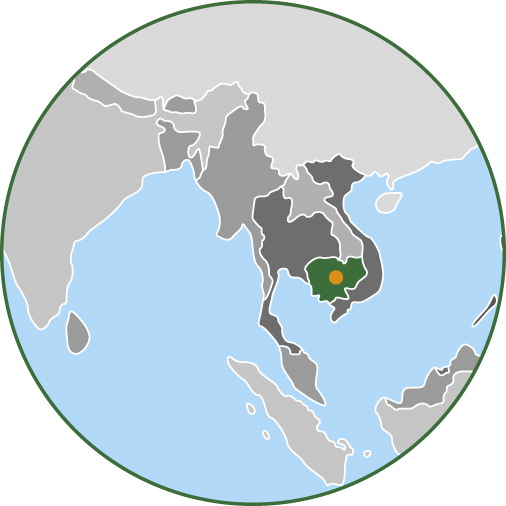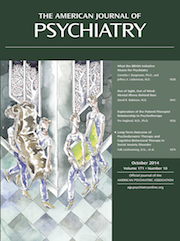Mr. C, a 22-year-old single man from a distant province, arrived at our private medical and psychiatric clinic in Phnom Penh, carried by his father. On arrival, Mr. C was pale, severely malnourished (weight, 37 kg; BMI, 12.4), with a nasogastric tube in place; his arms and legs were tremulous and in a flexed position. His pulse was 97 and his respiratory rate 24; he was afebrile but had a cough. Mr. C did not respond to his name or to simple commands. He made no eye contact, looked sad, and did not speak, either spontaneously or in response to questioning. We obtained the following information from his father.
Mr. C came from a well-off family and held a university degree in business management. He had no history of medical or psychiatric problems until 3 years earlier, when he returned home from his clerical job in another province to attend his grandmother’s funeral. At that point he was very thin, ate little, appeared sad and tired, and had difficulty sleeping. He also had several episodes resembling generalized tonic-clonic seizures, followed by loss of consciousness and high fever. He was treated for meningitis (the medications were not identified) but made minimal recovery. Mr. C's parents, having little faith in Cambodian health care, took him to a well-known Vietnamese hospital, where various tests were performed. Results of blood tests, malaria smears, lumbar puncture, and CT scan of the brain were all within normal limits. Nonetheless, the patient was treated presumptively for bacterial meningitis. After 3 weeks, he regained consciousness, was afebrile, and began eating, and he was discharged shortly thereafter.
Over the next 3 years, Mr. C’s symptoms persisted despite outpatient treatment in Cambodia and two additional inpatient admissions in Vietnam. The family, believing that they had brought on the illness by offending ancestral spirits, visited a Kru Dors Ampeu (a healer who can dispel evil spirits) and Buddhist monks, to no avail. Mr. C was discharged from his third hospitalization in Vietnam weak and confused, with a nasogastric tube for feeding. The discharge diagnosis was cerebral injury postmeningitis.
One hour after our initial interview, as the radio happened to play a song that narrated the sad tale of a brokenhearted man, Mr. C turned toward the music. His tremors decreased. When one of his clinicians asked if he liked the song, Mr. C looked at him, replied “Yes,” and turned back toward the music. At this point, we suspected that he suffered from depression linked to a romantic loss and hypothesized that the song reminded him of his own situation. We tentatively diagnosed major depressive disorder with severe anorexia. Neurological sequelae postmeningitis, somatization disorder, epilepsy, chronic brain infection, and malingering were also on the differential diagnosis.
To improve Mr. C’s hydration and nutritional status and to treat possible pneumonia, we administered intravenous fluids with amino acids, vitamin B, and ceftriaxone. As the patient could not take oral medication, we added intravenous amitriptyline (25 mg/day) and diazepam (10 mg/day) for treatment of depression.
On the morning after his arrival, Mr. C removed his nasogastric tube, sat up in bed, and ate some bananas. He was more lucid, and his tremor and abnormal movements had decreased. He asked to listen to other love songs. We supplied the requested recordings. He began to eat soft food, but still did not answer our questions.
Beginning the second week after admission, Mr. C’s cognitive function improved. He related the following history: While working at his clerical job, he fell in love with a beautiful young coworker. They talked as friends, but he dared not confess his love. He worried constantly that she didn’t like him, or that she would marry a richer man. Subsequently, when at her parent’s request she became engaged to a man from her home province, Mr. C was devastated. After her wedding, Mr. C became deeply sad, cried every night, and developed anhedonia, poor concentration, excessive worry, insomnia, anorexia, fatigue, guilt feelings, hopelessness, low self-esteem, self-neglect, and lack of initiative. Too embarrassed to tell anyone about his broken heart, he decided to starve himself to death, choosing starvation rather than another form of suicide to avoid shaming his family. Death from a natural, unexplained illness, he said, would not shame his family as would shooting, overdose, or hanging.
Listening to the love songs reactivated his experience of romantic loss. While talking with family members about his broken heart would bring great embarrassment, he felt comfortable confiding in his clinicians. Music played an important role in helping him disclose his secret.
Once Mr. C began speaking, the infusions were stopped and he was switched to oral medications. We started him on fluoxetine, titrated to 60 mg/day, and nortriptyline, 25 mg at bedtime (for sleep and depression), as well as vitamin supplements. After 1 month of treatment, Mr. C’s weight increased to 49 kg and his BMI to 16.4, his suicidal thinking abated, his depressive symptoms began to remit, his cognitive functioning improved, and he looked more cheerful.
To help deal with his suicidality, we reminded Mr. C that “suicide is against Buddha’s rules.” By incorporating Buddhist concepts, we helped Mr. C see that the young woman he loved was not meant to be his future wife. In fact, had he married her, his suffering might actually have increased. With this in mind, Mr. C decided to care for himself so that he could work, earn money, and find a different woman to marry.
After a 6-week inpatient stay at our clinic, Mr. C returned to his home province. He continued outpatient treatment, mostly by telephone. Two years later, his mood remained good; he was married, had successfully started a small travel agency, and reported no more seizures. Fluoxetine and nortriptyline were gradually tapered and discontinued.
Discussion
Initially, diagnosis and treatment of this patient focused on the most common causes of high fever with seizures in Cambodia: meningitis and cerebral malaria. In Vietnam, Mr. C was again treated for meningitis despite negative tests; the Vietnamese physicians may have believed that the lumbar puncture results were negative because of previous partial treatment. Mr. C’s condition improved, likely as a result of intravenous hydration and nutritional supplements, and he returned home. During subsequent treatments in Vietnam, where physicians paid little attention to psychosocial aspects of the case, he achieved very limited recovery.
In Cambodia, psychiatric problems are often overlooked, misinterpreted, and neglected by patients, families, and health professionals. Before reaching a psychiatrist, patients have often seen multiple practitioners, including primary care physicians, specialists, and traditional healers. The stigma of mental illness is high, and patients may be ostracized by family, friends, and community. Because psychiatric problems often present with physical symptoms, considerable effort and expense (often enough to bankrupt families) are given to medical workups. Patients do not usually talk at length with their doctors: rather, doctors who ask too many questions before diagnosing may be seen as less skilled.
Most Cambodians believe that illness has spiritual, rather than (or in addition to) psychosocial or biological origins. Accordingly, help is often sought from Buddhist monks and traditional healers. To improve the treatment alliance, mental health practitioners must respect their patient’s beliefs and the healers they choose.
As most Cambodians are Buddhist, problems are interpreted through Buddhist perspectives. Buddhism advises recasting events in positive ways: “When you suffer from one problem, you are lucky that you are not suffering from an even more severe problem.” Buddha taught “right thinking” and “right actions.” For Mr. C, wrong thinking (he could not believe that there were other beautiful young women he might marry) led to wrong action (he gave up looking for other potential brides).
In Cambodia, psychiatrists strive to combine the lessons of Western psychiatry with local beliefs regarding causation and treatment of mental illness. Stigma is still great; efforts to raise mental health awareness among nonpsychiatrist physicians and the general public must continue.


